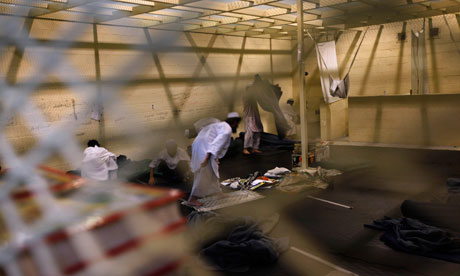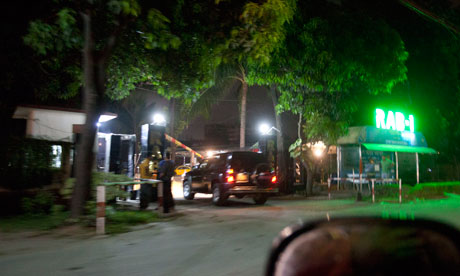Obama lawyers file a breathless, angry appeal against the court ruling that invalidated the NDAA’s chilling 2011 detention law

Musings by Shahidul Alam

On July 26, the?Ramon Magsaysay Award Foundation?(RMAF) announced the six winners of the 2012 Ramon Magsaysay Award, Asia’s highest honor, and widely regarded as the region’s equivalent of the Nobel Prize. Established in 1957, the award celebrates the memory and leadership example of the third Philippine President of the Third Republic, Ramon Magsaysay. The awardees were from Bangladesh, Cambodia, India, Indonesia, Philippines and China (Taiwan).
 |
Syeda?Rizwana Hasan, ’07, Bangladesh, is recognized for “her uncompromising courage and impassioned leadership in a campaign of judicial activism in Bangladesh that affirms the people’s right to a good environment as nothing less than their right to dignity and life.” The award is given every year to Asian individuals or organizations that manifest the same sense of selfless service that ruled the life of the late and beloved Filipino leader. The award is given to persons regardless of race, nationality, creed or gender who address issues of human development in Asia with courage and creativity, and in doing so have made contributions which have transformed their societies for the better.
RMAF President?Carmencita Abella, ’86, Philippines, said, “The Magsaysay awardees of 2012 are six remarkable individuals, all deeply involved in creating sustainable solutions to poverty and its accompanying disempowerment, whether in the forests or on farmlands, in exploitative industries or in inadequate education. Working selflessly in unpretentious yet powerful ways, they are showing how commitment, competence, and collaborative leadership can truly transform millions of individual lives and galvanize progressive community action.” “Their concerns are clearly quite diverse-agricultural productivity, environmental justice, farmer education, women economic empowerment, good education for the young. But there is one thing these Magsaysay laureates share: a greatness of spirit which infuses their distinct leadership for change. Working with others, they all single-mindedly apply their skills to their passion for improving the lives of others. They all refuse to give up, despite adversity and opposition. They are all deeply rooted in hope,” Abella said.
The six 2012 Magsaysay awardees join 290 others who have received Asia’s highest honor to date. The Award winners will each receive a certificate, a medallion bearing the likeness of the late President and a cash prize. They will be formally conferred the Magsaysay Award during Presentation Ceremonies to be held on August 31 at the Philippine International Convention Center.
 Josie Appleton The Guardian,
Josie Appleton The Guardian, 
In that strange coastal town-city where it rains every morning, I partake of pain as if it is prayer. Married to a violent man who treats me with nothing but distrust and suspicion, my skin has seen enough hurt to tell its own story.
In the early days, his words win me back: I don?t have anything if I don?t have you. In this honeymoon period, every quarrel follows a predictable pattern: we make up, we make love, we move on. It becomes a bargain, a barter system. For the sake of survival, I surrender my space.


The system, intended to limit the influx of foreigners at a time of economic and security tensions, seems straightforward enough on paper. While some artists qualify for ?temporary worker? status, the rules are intended to ensure that those who make brief visits for exhibitions, festivals, readings and the like do not earn money or try to remain in the country. But they have proved so onerous and so open to subjective misreading that even people who have been coming to Britain for years are suddenly being refused entry.
?Artists and authors are being treated as if they are potential economic migrants or terrorists,? said Jonathan Heawood, director of the literary human-rights group English PEN, which has been pressing the government to loosen the rules. ?Essentially the government is trying to crowbar them into a system that wasn?t designed for them and that sees them as a threat and not a benefit.?
Recent victims of the system include the Russian-born, New York-residing beat poet Alex Galper, who was turned away when he planned to read for no fee at a charity event; the Georgian artist Gela Patashuri, who was commissioned to produce a work for a London gallery but whose visa was denied because the authorities said they were ?not satisfied? with his qualifications; and the renowned Iranian director Abbas Kiarostami, who canceled plans to direct ?Cos? Fan Tutte? at the English National Opera after his visa was granted and then withdrawn, and he was told to re-apply and to give his fingerprints again.
Britain is not the only Western country with tough borders. The United States has a notoriously arduous visa application system that has led to numerous well-publicized cases of artists and performers being refused entry.
But in Europe, Britain stands out for the strictness of its policies and the apparent inconsistencies in the way it enforces them.
Continue reading “Britain puts out an unwelcome mat”
The garment industry is one of the?largest industrial sectors in Bangladesh. It accounts for a good portion of the country?s exports and employs more than three million workers. Most of them are women.
?Workers toil from dawn to dusk on minimum wage,? said?Taslima Akhter, a Bangladeshi photographer who has spent more than four years capturing the workers? movement for ?The Life and Struggle of Garment Workers.?
Ms. Akhter, 37, was compelled to bring to light some of the industry?s darker aspects, like dangerous working conditions and low salaries. As an activist, a photographer and a resident of Bangladesh, she sees the ongoing project as both a personal agenda and a civic duty.
Ms. Akhter said she believed that the struggle of garment workers ? particularly women ? was one of the country?s most pressing issues. A transition to democracy in Bangladesh would raise questions about women?s rights, she said, expressing hope that her project could help speed the country toward that goal? ? and inspire the workers to make their own voices be heard.
In 2006, garment workers in Bangladesh made less than $25 per month, Ms. Akhter said. Following a tremendous protest in 2010, their wages increased to just under $45 monthly ? still not a living wage.
That strike ? and the number of women who participated ? drove Ms. Akhter to continue her work on the project, most of which she photographed in and around her hometown, Dhaka, the capital of Bangladesh. (Outside Dhaka, she shot in Gazipur, to the north, and Narayanganj, to the east.) Ms. Akhter studied photojournalism at the?Pathshala South Asian Media Academy in Dhaka in 2007. She completed a master?s degree in philosophy from theUniversity of Dhaka. She just completed a six-week course on photography and human rights at New York University?s?Tisch School of the Arts as part of a?Magnum Foundation scholarship she was awarded in 2010.
It is an article of faith in Bangladesh that three million people died in its war of independence in 1971. At that time, the population of the former East Pakistan (which became Bangladesh) was about 70 million people, which means nearly 4% of the population died in the war. The killings took place between 25 March, when Pakistani forces launched?Operation Searchlight, and mid-December, when Dhaka fell to the invading Indian Army and the Mukti Bahini forces (who was aiding whom depends on which narrative you read? India?s or Bangladesh?s). As per Bangladesh?s understanding of its history, the nation was a victim of genocide. Killing three million people over 267 days amounts to nearly 11,000 deaths a day. That would make it one of the most lethal conflicts of all time.
One of the most brutal conflicts in recent years has been in the Democratic Republic of Congo, where the International Rescue Committee reported that 5.4 million people died between 1998 and 2008. A more thorough Canadian analysis now concludes that the actual figure is about half. At 5.4 million deaths, the daily death toll would be around 1,500; at 2.7 million, around 750. Was the 1971 war up to 15 times more lethal than the Congolese conflict?

A history of violence: A scene from the bloody conflicts of the 1971 Bangladesh war. Photo: Getty Images
It is an uncomfortable question. Many Bangladeshis feel that raising such a doubt undermines their suffering and belittles their identity. But a thorough, unbiased study, going as far as facts can take the analysis, would be an important contribution to our understanding of the subcontinent?s recent history.
Continue reading “Subcontinental drift”
This article was published on?guardian.co.uk at?18.46 BST on Thursday 4 August 2011. A version appeared on p10 of the?Main section section of?the Guardian on?Friday 5 August 2011. It was last modified at?00.06 BST on Friday 5 August 2011.

Government ministers were extraordinarily sensitive about the contents of the secret?MI5 and?MI6 interrogation policy document when the Guardian became aware of its existence two years ago.
Initially, its purpose was to permit the questioning of prisoners being held at Bagram air base, north of Kabul, in the wake of the 9/11 attacks, despite it being clear that these men were being severely abused by members of the US military.
In time, the policy developed into one governing the conduct of British intelligence officers who were questioning terrorism suspects held by some of the world’s most notorious security agencies.
As a number of these men began to emerge from captivity, some bearing clear signs of having been tortured, the ministers became even more nervous. The disclosure of the contents of the document helps explain why.
Tony Blair evaded a series of questions over the role he played in authorising changes to the instructions in 2004, while the former home secretary David Blunkett maintained it was potentially libellous even to ask him questions about the matter.
As foreign secretary, David Miliband?told MPs the secret policy could never be made public as “nothing we publish must give succour to our enemies”.
Blair, Blunkett and the former foreign secretary Jack Straw also declined to say whether or not they were aware that the instructions had led to a number of people being tortured.
The head of MI5,?Jonathan Evans, said that, in the post 9/11 world, his officers would be derelict in their duty if they did not work with intelligence agencies in countries with poor human rights records, while his opposite number at MI6, Sir John Sawers,?spoke of the “real, constant, operational dilemmas” involved in such relationships.
Others, however, are questioning whether, in the?words of Ken Macdonald, a former director of public prosecutions, “Tony Blair’s government was guilty of developing something close to a criminal policy”.
The Intelligence and Security Committee, the group of parliamentarians appointed by the prime minister to assist with the oversight of the UK’s intelligence agencies, is known to have examined the document while sitting in secret. However, it is unclear what ? if any ? suggestions or complaints it made.
Paul Murphy, the Labour MP and former minister who chaired the committee in 2006, declined to answer questions about the matter.
A number of men, mostly British Muslims, have complained that they were questioned by MI5 and MI6 officers after being tortured by overseas intelligence officials in Pakistan, Bangladesh, Afghanistan and Guant?namo Bay. Some are known to have been detained at the suggestion of British intelligence officers.
Others say they were tortured in places such as Egypt, Dubai, Morocco and Syria, while being interrogated on the basis of information that could only have been supplied by the UK.
Some were subsequently?convicted of serious terrorism offences or subjected to control orders. Others were returned to the UK and, after treatment, resumed their lives.
One is a?businessman in Yorkshire, another a?software designer living in Berkshire, and a third is a?doctor practising on the south coast of England.
Some of the men have brought civil proceedings against the British government, and a number have received compensation in out-of-court settlements. Others remain too frightened to take action.
Scotland Yard has examined the possibility that one officer from MI5 and a second from MI6 committed criminal offences while extracting information from detainees overseas, and detectives are now conducting what is described as a “wider investigation into other potential criminal conduct”.
A new set of instructions was drafted after last year’s election,?published on the orders of David Cameron, on the grounds that the coalition was “determined to resolve the problems of the past” and wished to give “greater clarity about what is and what is not acceptable in the future”.
Human rights groups pointed to what they said were serious loopholes that could permit MI5 and MI6 officers to remain involved in the?tortureof prisoners overseas.
The issue of alleged torture in custody continues to haunt political, military and intelligence elites on both sides of the Atlantic. On Thursday a judge in America allowed a former military contractor who claims he was imprisoned and tortured by the US army in Iraq to sue the former defence secretary Donald Rumsfeld personally for damages.
The man, an army veteran whose identity has been withheld, was working as a translator for the US marines in the volatile Anbar province when he was detained for nine months at Camp Cropper, a US military facility near Baghdad airport dedicated to holding “high-value” detainees.
The US government says he was suspected of helping to pass classified information to the enemy and helping anti-coalition forces enter Iraq. But he was never charged with a crime, and he says he never broke the law.
Lawyers for the man, who is in his 50s, claim he was preparing to return to the US on annual leave when he was detained without justification and that his family were told nothing about his whereabouts or whether he was still alive.
Court papers filed on his behalf say he was repeatedly abused, then released without explanation in August 2006. Two years later, he filed a suit in Washington arguing that Rumsfeld personally approved torturous interrogation techniques on a case-by-case basis and controlled his detention without access to the courts, in violation of his constitutional rights.
Binyam Mohamed, 33, returned to Britain in 2009 after his release from Guantan?mo Bay. An MI5 officer was alleged to have been involved in an interview with Mohamed in Pakistan and to have seen him three times while he was being held in Morocco.
Faisal Mostafa, 47, a chemist from Stockport, was repatriated from Bangladesh last summer after being detained in Dhaka in 2009. He is said to have been hooded, strapped to a chair and questioned about the UK while a drill was driven into his shoulder and hip.
Alam Ghafoor, 40, from Huddersfield, said he was held on a business trip in the United Arab Emirates after the London 7/7 bombings. The Foreign Office insisted he had not been detained at the request of the UK. Released after signing a false confession.
Zeeshan Siddiqui, a British citizen detained by the Pakistani security services and tortured while they accused him of being a member of al-Qaida. He returned to the UK and was placed under a control order. He absconded and is still missing.
——
Previous articles on RAB
Death Squad
Bangladesh Torture Centre
ASKED what his priority was upon arrival in London to take charge of the unraveling of his UK newspaper, News of the World (NoW), Rupert Murdoch pointed to his red haired CEO of News International, saying ??Her??.? That gave the game away.
Rebekah Wade (before she became Mrs Brooks) was editor of the NoW when much of the celebrity phone hacking and cheque – book journalism scandal was rampant.? She was promoted to CEO by Rupert. She was in charge of the internal investigation that declared it to be the work of one rogue reporter. Some charitable commentators speculate that Rebekah Wade was covering up the scandals from the chairman who knew nothing.
Anyone familiar with how the Murdoch organisation works will know that nothing of significance is allowed to happen in any part of the global empire without direct approval of The Boss. None of his minions dare risk any initiative without express permission. After securing that, they gloat over lesser minions in turn, ordering them to charge up whichever hill.
Rebekah Wade knows too much of how high up the phone-hacking, pay-offs to police and hush money to victims was sanctioned. At the Parliamentary hearing will she confess? She has stood steadfast so far, denying any knowledge of these shenanigans. But if she were subsequently to be charged for complicity in criminal activity, will she spill the beans on her boss?? Murdoch? is? a? master of realpolitik and the mesmerising power of money. He knows only too clearly where his priority lies in this case. Will Rebekah Wade endure a term in prison with her trap shut, like Andy Coulson before her?? Let us watch this morality play unfold.? Loyalty more than competence, is prized highly infamily businesses. It plays to the insecurity of the owners. At News Corporation that is worth gold.
Ingrained in the British polity is a free press pride of mythic proportions. Murdoch converted that to a licence to print money by feeding the prurient and voyeuristic instincts of society.? British institutional reluctance to interfere with the mechanics of a rigorous press worked to his advantage. ?Using this fig-leaf of press freedom, his gutter press outreached.
??Give the people what they want?? was his amoral justification for a diet of boobs on Page 3 of The Sun and lurid sexual peccadillos of politicians and celebrities across NoW pages. Mr Murdoch?s low opinion of his readers is amply summed-up by a former managing director: ??Most people are like sheep. Let?s shear them.??
Often innuendo was enough to ruin careers and reputations. It sold his newspapers vigorously ahead of his more inhibited rivals.? Neither Murdoch nor his editors cared about the lives they broke.? They never let facts get in the way of a good story. An editorial fund to pay off victims who initiate libel suits was just a cost of doing business.? To keep up a daily menu of startling disclosures year after year for this cynical publishing formula, required stretching beyond court hearings and crime beats (available to all newspapers). It required hacking into private telephone conversations, voicemails, sms plus paying sleuths to steal confidential banking and hospital records.
This yielded rich dividends for the Murdoch papers. They were never short of saucy leads, embarrassing photographs or helpless victims. They ??scooped?? the competition routinely.
The other tabloid rivals have shown remarkable restraint in not putting the boot into the Murdoch press. There is widespread suspicion that they are also guilty of phone-tapping and payments to police. Parliamentarians are calling for a comprehensive investigation into the links between the police, tabloids and the shadowy world of private detectives.
The toothless Press Complaints Commission (PCC) has again been unmasked as an utterly ineffective entity created not to self-regulate but to block independent investigation of errant members. Following the current NoW controversy, Parliament has pledged to scrap the PCC and replace it with a body independent of both the newspaper industry and government.
The dominance of NoW and The Sun in the UK is all the more remarkable when elsewhere the Internet, Blogs, Facebook and Twitter have evolved a dynamic ecosystem of crowd-sourced, realtime, instantaneous horizontal distribution of news, views, opinion and debate.
It was Dr Indrajit Banerjee, a Director at Unesco in Paris who coined the term ??Digi-logue?? to describe converging analogue and digital technologies and content flows. His point was that the established academic ways to map,?study and analyse Press, TV, Radio & Online channels as parallel communication?need to be radically reframed to make sense of the new realities. The boundaries are blurred and new possibilities are enabled.
Dr Andrew Taussig and I were privileged to be invited to address the Plenary session he chaired at the recent AMIC Conference in Hyderabad – on precisely this phenomenon.
For near 200 years newspapers perfected a super-efficient cycle of news production and mass distribution in a controlled, linear process with the editor at the centre.
The editor decided what will be printed and how the story will be told. More importantly, he decided what will NOT be printed and which stories will NOT be told.? The true power of the press was its ability to hide critical matters from public knowledge. Authoritarian governments and Big Business leveraged compliant editors to mislead the public.
The digi-logue environment has broken that stranglehold on news and opinion which mainstream press and TV enjoyed. Tweets from Sohaib Athar in Abbottabad:?A huge window-shaking bang here in AbottabadI hope it?s not the start of something nasty? was the first indication of the remarkable American raid on Osama bin Laden?s hideout which left the Pakistani military clueless even after the helicopters left with his body. No reporter was there to file the story.
Nic Newman of The Reuters Institute at Oxford University says that Twitterers are ??influencers??.? ??The audience isn?t on Twitter but the news is on Twitter.?? Celebrities and politicians now regularly tweet their daily meetings and travels with a growing fan network. Sashi Tharoor, former UN Under – Secretary General and later junior minister in India?s Foreign Ministry, got into trouble for his tweets on meetings with foreign dignitaries and for lamenting travelling ?cattle-class? to conform to the Congress Party?s strictures on public travel for MPs.
Closer to home, Singapore?s recent elections and the ongoing Malaysian politics demonstrate the far reaching effects of social media, mobile communications and the Internet as citizens initiate, share, query and distribute information virally to groups and individuals without the agency of mainstream press or TV.
This is having interesting effects on the behaviour of journalists, editors and politicians. Mainstream press which once dismissed Bloggers out of hand, now follows the established ones closely to track the cyberchatter of posts and counter-posts. They quote Bloggers in press reports. ?The Malaysian government has invited Bloggers to press conferences. Dr Tony Tan bidding for Presidential elections in Singapore, announced his decision on a Blogging platform to reach young voters.
Governments and their intelligence agencies are vigilantly tracking cyberchatter for clues to political sentiment and the public will. The Chinese government is particularly adept at this silent eavesdropping. It has resulted in delayed statements from the Prime Minister to address public anger about rising food prices and unaffordable housing.
This crowd-sourced feedback bypasses the inefficient and unreliable network of spies and informers who filter intelligence for their political masters. In some ways this is an amplified, authentic mirror of public sentiment to governments which hopefully will reduce misbehaviour of the power structure.
It is all out there. The news process is becoming a ??curation?? of content from formal, informal and co-opted amateur sources on mobile phones, You Tube, Facebook and Twitter. Trusted brands have an advantage in credibility on all platforms which consumers access at different times of the day, from home to office and back. The people, formerly known as the audience, now participate in the process of news creation, sharing and verification.
Digital distribution of rich media blurs the previous distinction between printed, online and broadcast channels. News producers have to become multimedia?orchestrators for consumers who want to read, see, hear and experience news. Tablet publishing is the first such integrated rich-media platform for busy citizens on the go.?The garden variety reporter will be useless. Domain experts who comment, analyse and contextualise news will be needed to add value to content. News will be channel agnostic.?Dependency on advertising will diminish as news businesses find new revenue streams from consumers, brands and transactions.
Cyril Pereira is the Co-Chairman of Asian Publishing Convention